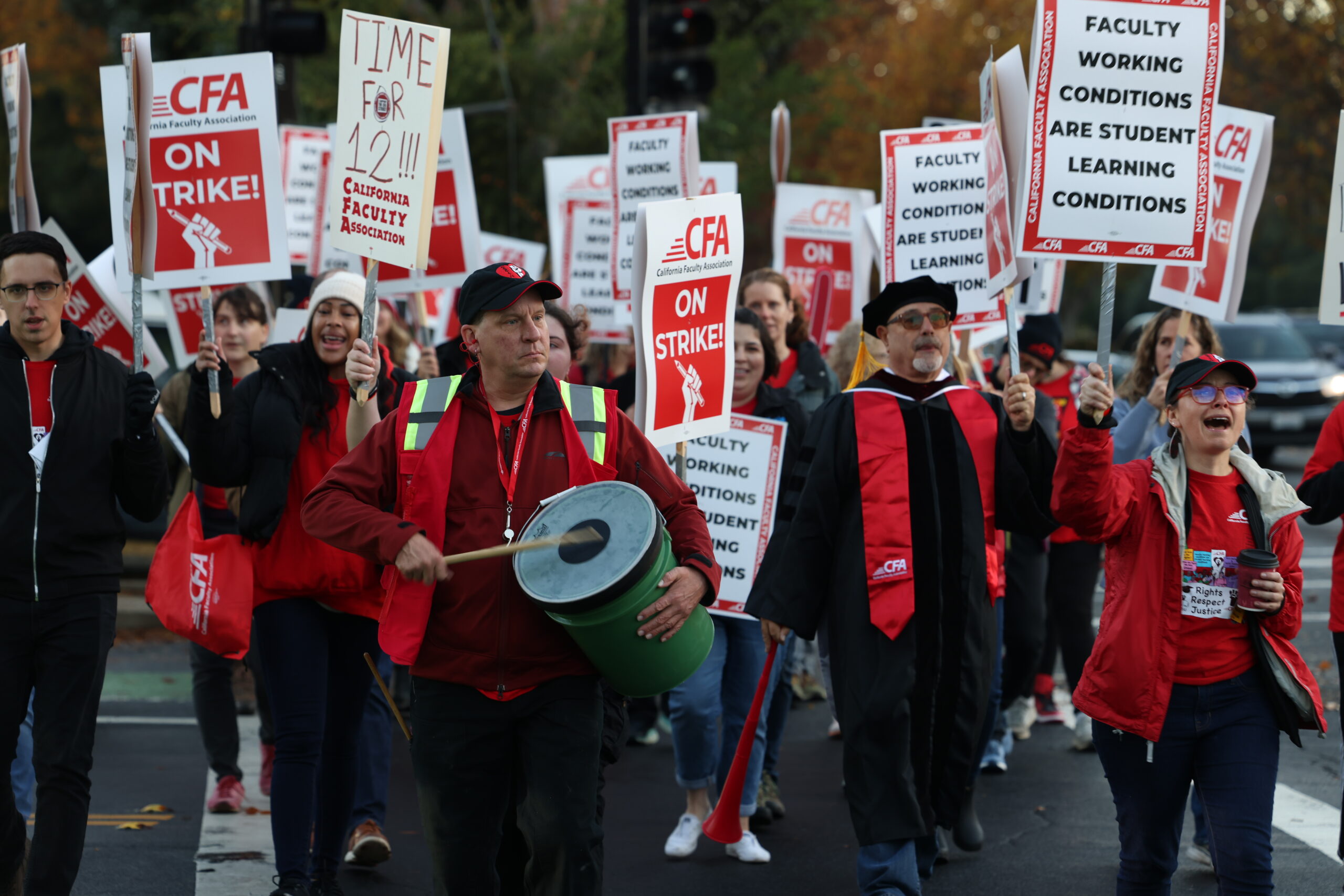New CSU Policy Chills ‘Free Speech that Administrators Do Not Want to Hear’
Faculty, students, staff, and community members are taking action against an anti-academic freedom of speech policy from CSU management.
The Chancellor’s Office issued a directive as a companion piece to its systemwide interim “Time, Place, and Manner” (TPM) policy beginning this Fall term. Among other things, the policy would limit academic freedom across the system’s 23 campuses, restrict face coverings, require advanced, written permission for posters, signs, banners, and chalking.
Although management asserts that these policies are intended to ensure a safe and peaceful campus, we believe they’re aimed at suppressing protests and future strike actions, all of which fundamentally undermine the civil liberties of faculty, students, and staff.
The CSU’s implementation of their new oppressive “Time Place and Manner” policy not only curtails free speech and basic civil rights, but also shows that CSU management is more interested in perpetuating their own power and agenda than in educating and respecting our students, community, and human rights, said Savanna Schuerman, CFA San Diego Lecturer Representative and San Diego State Lecturer.
“By repressing when, where, and how our students, faculty, and staff can express themselves and their views, the policy dictates why (and if) we get to speak; and – just as frightening – who gets to speak and who does not. This is not a premonition, but a statement on what is already happening. Multiple students of ours have already been profiled, targeted, and unjustly penalized by campus administrators, who are wielding the CSU’s new policy as a weapon to chill free speech that administrators do not want to hear,” Schuerman said.

Public discourse, rallies, protests, and teach-ins are hallowed milestones in the struggle for learning, progress, and justice in the United States. CSU management’s new policy would have banned the student protests at San Francisco State that established Ethnic Studies in the 1960s, as well as our strikes for better working conditions, parental leave, and raising the floor for our lowest-paid faculty during bargaining this year and last.
Several Academic Senates are taking up the restrictive policy, highlighting the CSU policy’s chilling effect on discourse, learning, and engagement, and administration’s lack of consultation with faculty, students, staff, and other stakeholders drastically impacted by the change.
Applying the new “directive” to faculty (or any represented employees) before we meet and confer with management is a violation of the Higher Education Employer-Employee Relations Act (HEERA). Because of the Chancellor’s HEERA violation, we filed a charge with the California Public Employment Relations Board (PERB). Our charge alleges that the CSU administration has failed to bargain in good faith with our members and that the administration has established a new code of conduct that implicates performance and discipline of faculty. (Although some of the conduct prohibited by the chancellor’s directive is prohibited by state law, other aspects of the chancellor’s directive involved CSU’s exercise of discretion, over which we had a right to notice and an opportunity to bargain.)
Our union siblings at the CSU Employees Union (CSUEU) are taking similar action to protect freedom of speech and union members’ rights. CSUEU members sent a cease-and-desist letter the CSU administration, and also filed an unfair practice charge with PERB.
While “time, place, and manner” policies have existed on our campuses for decades to regulate when, where, and how a campus is used, the new systemwide policy is a departure from past practices, as it is far more restrictive and oppressive than previous iterations. Moreover, the rollout of the new policy has led to repression of faculty such as the “CSU 5″ at Cal State Long Beach for using amplified sound at a teach-in on campus last May under the previous policy. All five faculty members research race and racism as teacher-scholars, and four of the five faculty members are people of color. We know that CSU management is capable of selective enforcement of its policy in ways that reproduce racist silencing.
We’ll continue our organizing efforts around this issue both locally and unionwide. You can reach out to your chapter representative to see how best to get involved.
Join California Faculty Association
Join thousands of instructional faculty, librarians, counselors, and coaches to protect academic freedom, faculty rights, safe workplaces, higher education, student learning, and fight for racial and social justice.